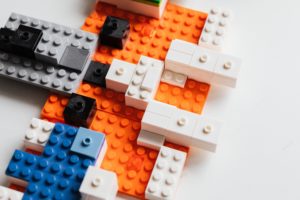 In today’s fast-paced, dynamic, and interconnected world, the importance of soft skills cannot be overstated. These skills include communication, teamwork, problem-solving, adaptability, and emotional intelligence, which are critical for personal and professional success. One innovative and engaging method for developing these vital competencies is LEGO® Serious Play® (LSP). In this article, we will explore the benefits of LSP, the neuroscience behind the methodology, and how we can use LSP as a valuable tool for enhancing soft skills in various settings.
In today’s fast-paced, dynamic, and interconnected world, the importance of soft skills cannot be overstated. These skills include communication, teamwork, problem-solving, adaptability, and emotional intelligence, which are critical for personal and professional success. One innovative and engaging method for developing these vital competencies is LEGO® Serious Play® (LSP). In this article, we will explore the benefits of LSP, the neuroscience behind the methodology, and how we can use LSP as a valuable tool for enhancing soft skills in various settings.
The LEGO® Serious Play Methodology
LSP is a unique, hands-on, and interactive approach that uses LEGO® bricks as a medium for communication, storytelling, and problem-solving. Developed by the LEGO® Group, the LSP methodology is based on “hand-mind connection,” which posits that manipulating physical objects can stimulate cognitive processes and foster creative thinking. The methodology also draws on theories from neuroscience, psychology, and education. LSP sessions are facilitated by trained professionals who guide participants through activities encouraging exploration, collaboration, and reflection.
Neuroscience and the Hand-Mind Connection
The LSP methodology is built on the idea that there is a strong connection between our hands and our brains. This connection is supported by neuroscience, which has shown that engaging the hands in activities can activate various areas of the brain associated with learning, memory, and creativity. By using LEGO® bricks as a tangible medium, LSP stimulates the brain’s neural pathways, allowing participants to tap into their innate creative abilities, problem-solving skills, and emotional intelligence.
Benefits of LEGO® Serious Play for Soft Skills Development
- Fostering creativity and innovation: LSP encourages participants to build models and create stories using LEGO® bricks, which can help unleash their imagination and promote innovative thinking. This process allows individuals to explore new ideas, challenge assumptions, and develop unique solutions to complex problems. In addition, the collaborative nature of LSP activities fosters a sense of shared ownership and collective creativity among participants.
- Enhancing communication and storytelling skills: The storytelling aspect of LSP enables participants to articulate their thoughts, ideas, and feelings more effectively. By creating and sharing their LEGO® models, individuals learn to communicate complex concepts and emotions clearly and concisely, an essential soft skill in personal and professional contexts. Moreover, the visual and tangible nature of the LEGO® models can serve as a universal language, bridging communication gaps among individuals with diverse backgrounds and perspectives.
- Encouraging collaboration and teamwork: LSP sessions often involve group activities and challenges, requiring participants to collaborate, share ideas, and build on each other’s contributions. This collaborative environment fosters strong team dynamics, mutual respect, and the ability to navigate diverse perspectives. Furthermore, the hands-on nature of LSP activities can help break down hierarchical barriers, create a sense of camaraderie, and promote an inclusive culture within teams.
- Building problem-solving and critical thinking skills: LSP encourages participants to approach problems from different angles and explore multiple solutions. By engaging in hands-on activities and reflecting on their experiences, individuals can develop a more nuanced understanding of complex issues and improve their problem-solving abilities. In addition, this iterative building, storytelling, and reflection process can foster a growth mindset and a willingness to learn from mistakes.
- Boosting self-awareness and self-confidence: Creating LEGO® models and sharing stories helps individuals better understand their strengths, weaknesses, and beliefs. This increased self-awareness can lead to greater self-confidence and a better understanding of how one’s actions impact others. Moreover, the non-judgmental environment of LSP sessions allows participants to express themselves openly, fostering self-acceptance and personal growth.
- Developing emotional intelligence: LSP can be an effective tool for enhancing emotional intelligence, which involves recognizing, understanding, and managing one’s emotions and those of others. By engaging in storytelling and reflection, participants can become more attuned to their emotional states and those of their peers. Additionally, the collaborative nature of LSP can help individuals develop empathy, active listening skills, and the ability to manage conflicts effectively.
Implementing LEGO® Serious Play in Soft Skills Development Programs
To maximize the effectiveness of LSP in enhancing soft skills, it is crucial to consider the following factors:
- Identify clear objectives: Before implementing LSP, ensure that the goals and desired outcomes of the sessions are clearly defined. This will help guide the facilitator and participants throughout the process, enabling them to focus on achieving specific soft skill improvements.
- Select an experienced facilitator: The success of LSP sessions depends mainly on the skill and expertise of the facilitator. Choose a trained LSP facilitator who can effectively guide participants, create a safe and inclusive environment, and adapt the methodology to suit the group’s needs.
- Tailor the program to the target audience: The LSP methodology can be customized to address a wide range of soft skills and cater to various age groups, professional backgrounds, and industries. When designing an LSP program, consider the unique characteristics and needs of the target audience and tailor the activities accordingly.
- Combined with other methods and tools: LSP should not be used as the sole method for soft skills development. Instead, it should be integrated with different approaches, such as workshops, coaching, and experiential learning, to create a comprehensive and practical development program. This multi-pronged approach can help reinforce learning, create synergies, and ensure participants acquire well-rounded soft skills.
- Assess progress and measure impact: To evaluate the effectiveness of LSP in enhancing soft skills, it is essential to establish metrics and assessment methods. These include participant feedback, self-assessments, peer evaluations, and performance indicators. Regular assessments can help identify areas of improvement, inform future LSP sessions, and demonstrate the program’s value to stakeholders.
LEGO® Serious Play® is a powerful and engaging tool that can significantly enhance the development of soft skills. By tapping into the power of play and leveraging insights from neuroscience, LSP fosters creativity, innovation, collaboration, and emotional intelligence, equipping individuals with the competencies needed to thrive in today’s complex world. First, however, it is essential to recognize the boundaries of LSP and combine it with other methods and tools to create a comprehensive and practical soft skills development program. Then, by implementing LSP thoughtfully and strategically, organizations and educators can empower their participants to unlock their full potential and succeed in an increasingly competitive and interconnected global landscape.
HJK


